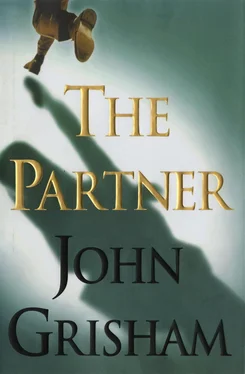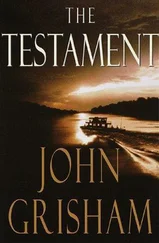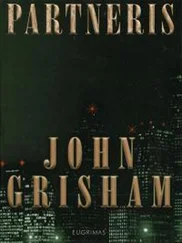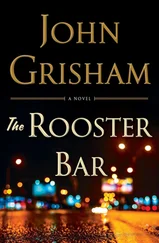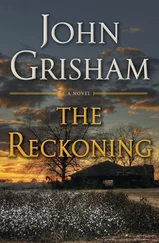“Damned right I do.”
“Good. How do you think we should prove our case?” Parrish asked.
“You’re the prosecutor. That’s your job.”
“Yeah, but you seem to know everything. Tell me, how would you prove the case?”
“He said he did it, didn’t he?”
“Yeah, and do you think Patrick Lanigan will take the witness stand in his own criminal trial and confess to the jury that he burned a corpse? Is that your idea of trial strategy?”
“He won’t,” Sandy inserted helpfully.
Sweeney’s neck and cheeks were red, and his arms were flailing in all directions. He glared at Parrish, then at Sandy.
And when he realized that these lawyers had all the answers, he brought himself under control. “When will this happen?” he asked.
“Late this afternoon,” Trussel said.
Sweeney didn’t like this either. He stuck his hands deep in his pockets and headed for the door. “You lawyers take care of your own,” he said, just loud enough for everyone to hear.
“One big happy family,” Parrish said, the sarcasm heavy.
Sweeney slammed the door and huffed down the hallway. He left the courthouse in his unmarked cruiser. Using his car phone, he called his own personal informant, a reporter with the Coast daily.
Since the family, such as it was, had given blanket approval, as had Patrick, the executor of the estate, the digging up of the grave was a simple matter. Judge Trussel and Parrish and Sandy didn’t miss the irony of having Patrick, Clovis’ only friend, sign an affidavit granting permission to open the casket so that Patrick could be cleared. Every decision seemed to be layered with irony.
It was far different from an exhumation, a procedure that required a court order, after a proper motion and sometimes even a hearing. It was simply a look-see, a procedure unknown to the Mississippi Code, and therefore Judge Trussel took great latitude with it. Who could be harmed? Certainly not the family. Certainly not the casket; evidently it was serving little purpose anyway.
Rolland still owned the funeral home up in Wiggins. How well he remembered Mr. Clovis Goodman and his lawyer, and the odd little wake out there in the county, at the home of Mr. Goodman, where no one showed up but the lawyer. Yes, he recalled it well, he told the Judge on the phone. Yes, he’d read something about Mr. Lanigan, and no, he hadn’t made the connection.
Judge Trussel gave him a quick summary, which led immediately to Clovis’ involvement in the plot. No, he had not opened the casket after the wake, had had no need to, never did in those situations. While the Judge talked, Parrish faxed to Rolland copies of the consents signed by Deena Postell and by Patrick Lanigan, the executor.
Rolland was suddenly eager to help. He’d never had a corpse stolen before, folks just didn’t do those things in Wiggins, and, well, yes, he could certainly have the grave opened in no time flat. He owned the cemetery too.
Judge Trussel sent his law clerk and two deputies to the cemetery. Under the handsome headstone:
CLOVIS F. GOODMAN
JANUARY 23, 1907, TO FEBRUARY 6, 1992
GONE ON TO GLORY
a backhoe carefully picked through the loamy soil as Rolland gave directions and waited with a shovel. It took less than fifteen minutes to reach the casket. Rolland and a helper stepped into the grave and shoveled away more dirt. The poplar had started to rot around the edges of the coffin. Rolland straddled the lower half of the casket and with dirty hands inserted the church key. He jerked and pried until the lid made a cracking sound, then he slowly opened it.
To no one’s surprise, the casket was empty.
Except, of course, for the four cinder blocks.
The plan was to do it in open court, as required by law, but to wait until almost five, when the courthouse was closing and many of the county employees were leaving. Five o’clock sounded fine to everyone, especially to the Judge and the District Attorney, who were convinced they were doing the right and proper thing, but were nervous about it nonetheless. Throughout the day, Sandy had pushed hard for a quick disposal once the plea agreement had been reached and the casket opened. There was no reason to wait. His client was incarcerated, though this received little sympathy. The court was in the middle of a scheduled term. The timing was perfect. What could be gained by waiting?
Nothing, His Honor finally decided. Parrish did not object. He had eight trials scheduled over the next three weeks, and unloading Lanigan was a relief.
Five was most satisfactory for the defense. With a bit of luck, they could be in and out of the courtroom in less than ten minutes. Another bit of luck, and no one would see them. Five was perfect for Patrick. What else did he have to do?
He changed into a pair of loose-fitting khakis and a large white cotton shirt. He wore new Bass loafers, no socks because of the rope-burned ankle. He hugged Hayani and thanked him for his friendship. He hugged the nurses and thanked the orderlies, and promised them all he’d be back soon to visit again. He wouldn’t, and everyone knew it.
After more than two weeks as a patient and prisoner, Patrick left the hospital, his lawyer at his side, his armed escorts following dutifully behind.
Evidently five was a perfect time for everyone. Not a single courthouse employee left for home once word reached every corner of every office, a process that took only minutes.
A real estate secretary for a large law firm was busy checking a land title in the office of the Chancery Clerk when she overheard the latest Patrick report. She raced to the phone and called her office. Within minutes the entire legal community along the Coast knew that Lanigan was about to plead guilty in some strange deal, and would attempt to do so secretly at five in the main courtroom.
The notion of a clandestine hearing to complete a backroom deal made for a frenzy of phone calls; calls to other lawyers, to wives, to favorite reporters, to partners out of town. In less than thirty minutes, half the city knew Patrick was about to make an appearance and a deal, and most likely walk.
The hearing would have attracted less attention had it been advertised in the newspaper and posted on billboards. It was to be quick and secretive. Mystery engulfed it. It was the legal system protecting one of its own.
They grouped in pockets of hushed gossip in the courtroom, whispering while watching people stream in, and guarding their seats. The crowd grew and gave further credence to the hearsay. All these people couldn’t be wrong. And when the reporters arrived, the rumors were immediately confirmed as facts.
“He’s here,” someone said, a court clerk up near the bench, and the curious began finding seats.
Patrick smiled for the two cameramen rushing to meet him by the back door. He was led to the same jury room on the second floor, where the handcuffs were removed. His khakis were an inch too long, so he methodically rolled them up and cuffed them. Karl entered and asked the deputies to wait in the hall.
“So much for a quiet little appearance,” Patrick said.
“Secrets are hard to keep around here. Nice clothes.”
“Thanks.”
“This reporter I know from the Jackson paper asked me to ask you—”
“Absolutely not. Not a word to anybody.”
“That’s what I figured. When are you leaving?”
“I don’t know. Soon.”
“Where’s the girl?”
“Europe.”
“Can I go with you?”
“Why?”
“Just want to watch.”
“I’ll send you a video.”
“Gee thanks.”
“Would you really leave? If you had the chance to walk away, to vanish right now, would you do it?”
Читать дальше
